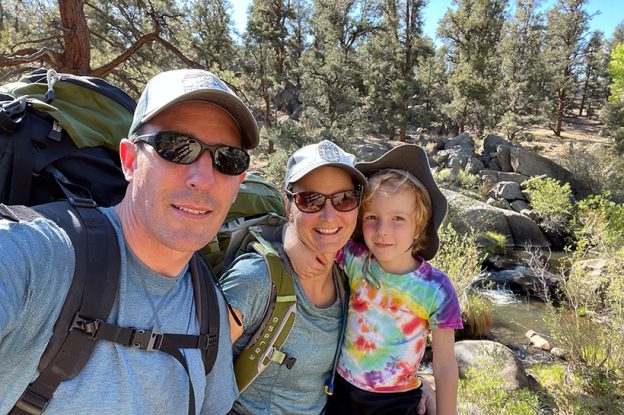
5 questions for … Dr. Sonya Negriff
Sonya Negriff, PhD, is a developmental psychologist with expertise in the effects of child maltreatment on physical and mental health. She has been with the Department of Research & Evaluation for 3 years. Dr. Negriff examines the pathways linking child maltreatment to negative outcomes such as depression, post-traumatic stress disorder, substance use, obesity, and sexual risk behaviors with the goal of finding ways to prevent these negative outcomes.
Tell me about the focus of your research.
My focus is understanding how maltreatment of children affects their mental and physical health, and how that occurs through the biological embedding of experiences. I study this through the prism of a biopsychosocial model, which is the understanding that the development of mental or physical disease is based upon a dynamic process with a deep interrelation of biological, psychological, and social factors that lead to a given outcome.
How did you become interested in the connection to childhood maltreatment and physical and mental health in adulthood?
I began this work while earning my PhD at the University of Southern California. I was doing data collection for a study of children who had been referred to child welfare for child abuse or neglect. I interviewed these children and their parents and learned about their experiences.
I was struck by how these childhood experiences impacted physiological functioning, like reactions to stress, which can have lasting effects across our lifetime.
However, in doing these interviews, I also saw how different the results were among children who had similar early trauma. So, even though some kids had really awful experiences, they were doing well and demonstrated resilience. That’s what interests me most, finding out how can we prevent or alter a negative trajectory and promote healthy development across the lifespan. We are searching for the way to do that with more children.
What current studies are you working on in that area?
One is a grant funded through the National Institutes of Health. We’re looking at the effect of childhood stress and trauma at an epigenetic level, examining changes in gene expression, which genes are turned “on” or “off”, to understand what potential protective factors or interventions we can use to help children be resilient and overcome early adversities.
Stressful experiences can “turn on” certain genes that are linked with inflammation, which is a known risk for a variety of diseases in adulthood. We will be able to test whether certain patterns of gene expression are linked with mental health across adolescence and what protective factors might allow recovery of healthy pattern of gene expression.
The study uses existing data from the study of children referred to child welfare that I was involved with at USC. In that study we had a cohort of 454 kids and their caregivers. We followed them from age 10 to 18.
In addition, as part of a new study that is a collaborative effort between Kaiser Permanente and USC, we are collecting data on this sample now that they are 28 to 33 years old. We hope to understand the impact that early experiences may have on the reaction to new stressor—such as the COVID-19 pandemic—and the effect on gene expression and mental health. We have consented about half of our expected sample and hope to have an initial analysis by early next year.
Any other studies related to the COVID-19 pandemic?
We also are looking at the safer-at-home order and its impact on child abuse by reviewing emergency department records here within Kaiser Permanente Southern California. We are trying to determine whether child abuse increased during the stay-at-home period of the pandemic.
Normally, teachers are the number 1 reporters of child abuse, but during safer-at-home kids weren’t going to school and families were staying home together in a more stressful environment. We wanted to see the impact of those factors on child abuse reports.
Preliminary data from our study shows that the number of children who went to the emergency department while stay-at-home orders were in effect was lower than the previous year, but a much higher percentage of children received a diagnosis of child maltreatment. We are now examining how many of those children were hospitalized.
Can you tell me about your work with ACEs?
Since coming to Kaiser Permanente, I’ve worked with clinical partners on the Adverse Childhood Experiences screening, known as ACEs, something that was first studied at Kaiser Permanente in the 1990s. At the time, the study showed how early childhood traumas and stress could be related to physical and mental health. Now we are trying to focus on how to intervene and help children recover from that early trauma to prevent the negative outcomes.
With a study funded by a Care Improvement Research Team grant, we are working on evaluating a new process to individualize treatment for kids who show early childhood trauma on their ACEs screening in pediatric primary care. We are using a social worker to triage each case identified by the pediatrician. The social worker completes a psychosocial assessment and refers the children and their parents to the appropriate services. Many children and their families may need a psychiatric referral, but some may be dealing with food insecurity or homelessness. The social worker will help each find a solution to their individual issue. We hope that by understanding and addressing the specific needs of each family, we can prevent future ACEs and reduce the negative outcomes of childhood trauma.
Bonus question: What do you enjoy doing in your spare time?
My husband and I have a 6-year-old and we like spending time outside. We go camping, hiking, and rock climbing. In the winter I go skiing and ice climbing. I love being outdoors and having new adventures!
Image: Sonya Negriff with husband Scott Lundy and son Cole Lundy backpacking in Kennedy Meadows, California.





